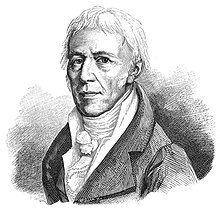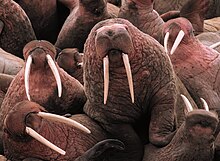 |
| Johnny Lamarck, birthday boy |
Lamarck was the first man whose conclusions [concerning the origin of species] excited much attention. This justly-celebrated naturalist first published his views in 1801, and he much enlarged them in 1809 in his “Philosophie Zoologique,” and subsequently, in 1815, in his Introduction to his “Hist. Nat. des Animaux sans Vertébres.” In these works he upholds the doctrine that species, including man, are descended from other species. He first did the eminent service of arousing attention to the probability of all change in the organic, as well as in the inorganic world, being the result of law, and not of miraculous interposition. Lamarck seems to have been chiefly led to his conclusion on the gradual change of species, by the difficulty of distinguishing species and varieties, by the almost perfect gradation of forms in certain organic groups, and by the analogy of domestic productions. With respect to the means of modification, he attributed something to the direct action of the physical conditions of life, something to the crossing of already existing forms, and much to use and disuse, that is, to the effects of habit. To this latter agency he seemed to attribute all the beautiful adaptations in nature; — such as the long neck of the giraffe for browsing on the branches of trees. But he likewise believed in a law of progressive development; and as all the forms of life thus tend to progress, in order to account for the existence at the present day of very simple productions, he maintains that such forms were now spontaneously generated.
Charles Darwin, "An Historical Sketch of the Progress of Opinion on the Origin of Species," an essay added to third edition of The Origins of Species.So Chuck thought well of his predecessor. (Interesting that the origin of species from other species is a "doctrine" that evidently preceded any sort of scientific theory to explain it.) Unless Lamarck did have such a theory:
"Great alteration in the environment of animals leads to great alteration in their needs... Now, if the new needs become permanent, the animals then adopt new habits which last as long as the needs that evoked them.... Every new need, necessitating new activities for its satisfaction, requires the animal, either to make more frequent use of some of its parts which it previously had used less, and thus greatly to develop and enlarge them; or else to make use of entirely new parts, to which the needs have imperceptibly given birth by efforts of its inner feeling."Leave aside the "inner feeling" whackadoodle and what we see is that Lamarck had anticipated the modern idea of the "extended phenotype." Classically, the environment was perceived as a sort of static and passive thing toward which the animal was well or poorly suited. Thus, when a finch was born with a beak ill-suited to nut-cracking, it would be unfit and selected out. (This was Blyth's view.) If a finch by happenstance was born with a more powerful beak, it would be better at the job of nut-cracking and become in Darwin's phrase a "favored race."
What was overlooked was why the finch was trying to crack nuts in the first place? Surely, there were other jobs available!
What defines a trait as "better fit" or not depends on what the critter is trying to accomplish. Darwin observed that organisms had an inner drive to continue living. Born with a long thin beak unsuited to nut-cracking, our mutant finch need not go off into a corner and die. Instead, she tries this or that or the other thing, trying to survive and reproduce. It might be that she tries pecking insects instead; and lo! it works and she thrives and a race of insect-pecking, thin-beaked finches redefines what it means to be "fit" for her descendants.
IOW, the organism actively participates in its own evolution. Natural selection may indeed sculpt a species toward greater fitness to its niche; but what Lamarck almost saw was that the animal's own habits, derived from its need to survive, help define that niche. The mistake lay in thinking that the striving alone can effect an evolution without the material to work with.
 Something once quite doggy became a seal, a bearish critter took up walrusing, and elephantic thing became a manatee. We can't suppose that a fortuitous set of mutations just so happened to be favorable for a bear to take up swimming when all her sisters were bearing. It is much more likely that the walrobear, cursed with certain walrusy traits, set about trying to survive and in the process managed to get by along the sea shore, thus redefining the criteria for future selection.
Something once quite doggy became a seal, a bearish critter took up walrusing, and elephantic thing became a manatee. We can't suppose that a fortuitous set of mutations just so happened to be favorable for a bear to take up swimming when all her sisters were bearing. It is much more likely that the walrobear, cursed with certain walrusy traits, set about trying to survive and in the process managed to get by along the sea shore, thus redefining the criteria for future selection. So, all hail Johnny Lamarck! Who almost got things right.



Lamarck gets an unfortunately bad reputation from always being contrasted with Darwin, but, as you note here, Darwin thought of the theory of natural selection as adding to and improving Lamarck's account.
ReplyDeleteOff-topic, but have you seen this little feature on cliodynamics?
So Lamarckianism is actually Monet-ism?
ReplyDelete